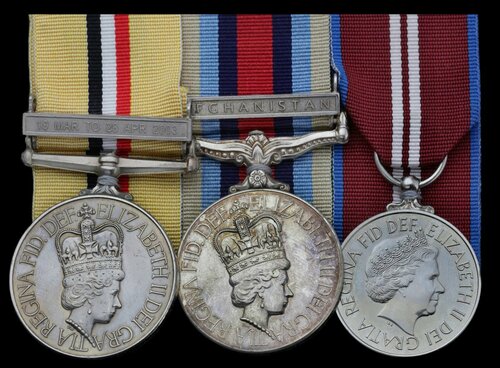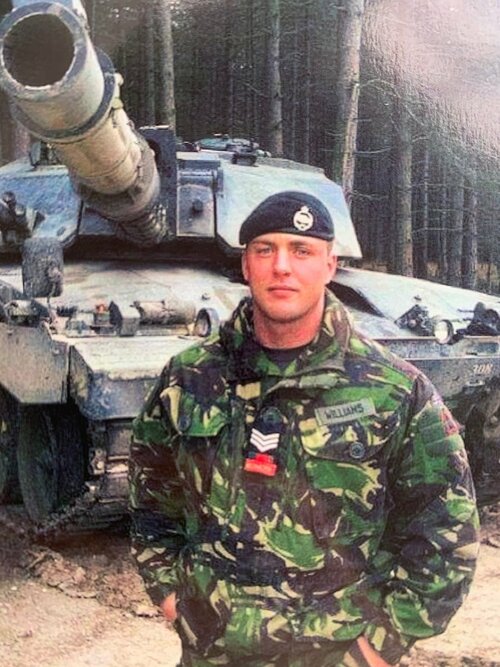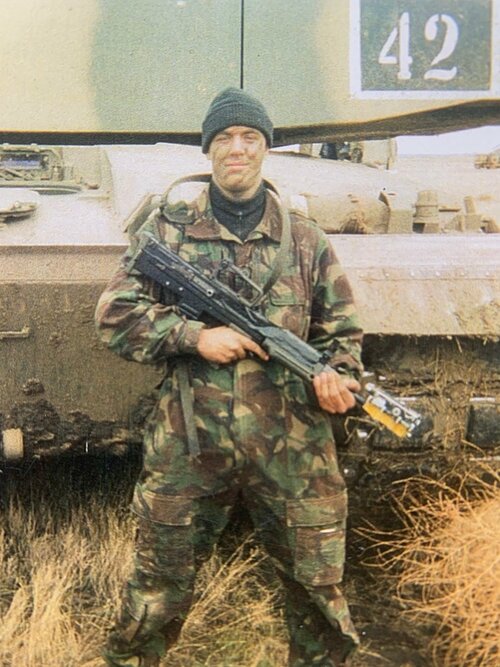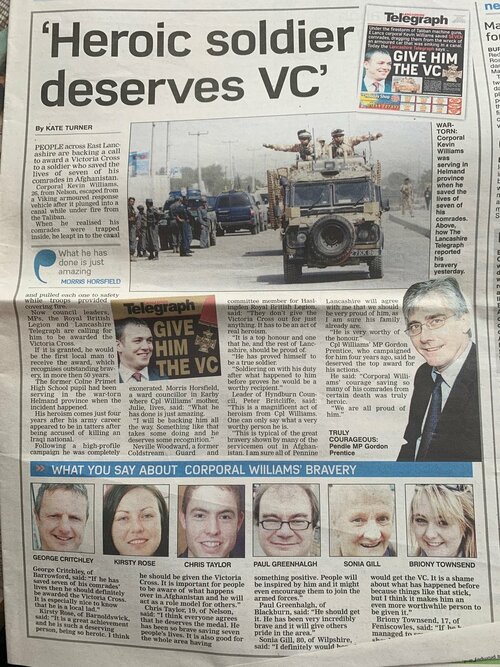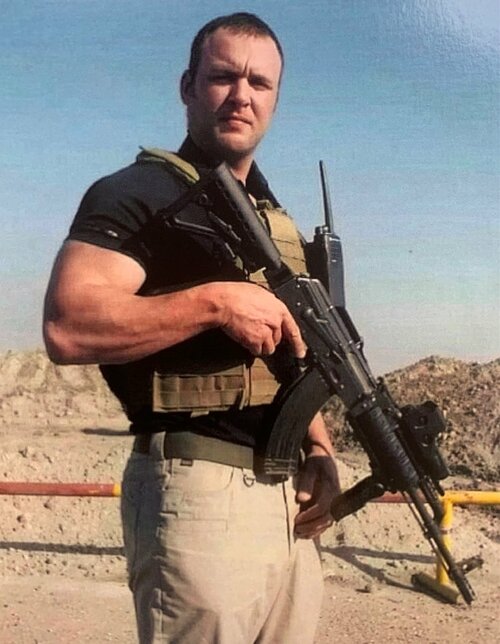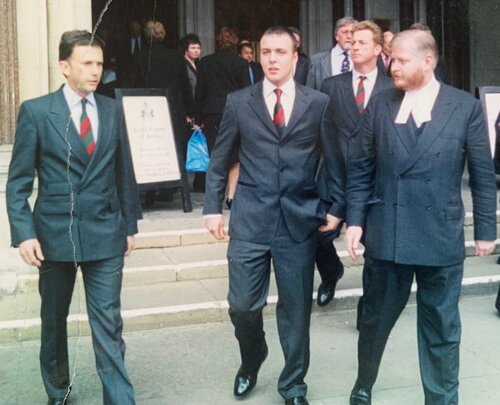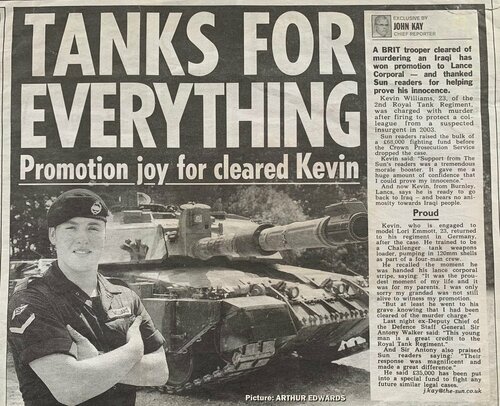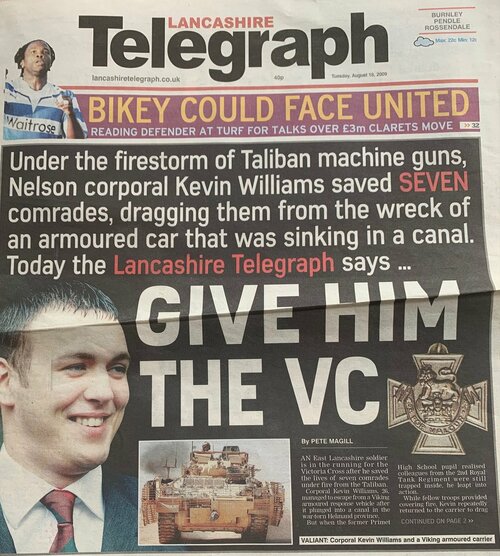Auction: 21001 - Orders, Decorations and Medals (conducted behind closed doors)
Lot: 729
(x) A remarkable and well-documented campaign group of three awarded to Sergeant K. L. Williams, Royal Tank Regiment
Having been tried on multiple occasions - and cleared on every occasion - for his actions which led to the death of an Iraqi civilian in an engagement in 2003; Williams returned to the fold and was lauded for his remarkable work in saving the lives of seven comrades whilst attached to the Welsh Guards when their Viking crashed into a deep canal in Helmand Province - his selfless actions came under hot fire from the Taliban and were recalled in Dead Men Risen
Just a few days later he was wounded when a devastating road side bomb ripped through the Viking he was commanding, it cost the life of Trooper Hammond, the driver, but also that of Lieutenant-Colonel R. Thorneloe, CO of the 1st Battalion, Welsh Guards, who became (and remains) the most senior British casualty since Lieutenant-Colonel 'H' Jones at Goose Green in 1982
Williams acted coolly, despite his own wounds applying tourniquets to Thorneloe, who had both of his legs blown off - his efforts were in vain but he was by his side as he slipped away; unsurprisingly Williams was feted as a hero and was recommended for the Victoria Cross, a fact widely reported in the Press
Perhaps as an unfortunate result of his previous time in the spotlight, that recommendation for the Victoria Cross was eventually downgraded to a Chief of Joint Operations Commendation
Iraq 2003-11, 1 clasp, 19 Mar to 28 Apr 2003 (25108881 Tpr K L Williams RTR); Operational Service Medal 2000, for Afghanistan, 1 clasp, Afghanistan (Cpl K L Williams RTR 25108881); Jubilee 2012, good very fine (3)
Kevin L. Williams, a native of East Lancashire, entered the Royal Tank Regiment in 1999. He was with the unit during the invasion of Iraq and it appeared his career might be over after the incident on his second Tour which cost the life of Hassan Abbas Said in Basra in August 2003. As reported:
'...was on a random patrol during his second tour of Iraq in 2003 when he came across up to nine men pushing a cart filled with ammunition. When the soldiers moved to arrest them, Mr Williams chased one to a nearby village and into his home. Mr Said refused to leave peacefully and after trying to grab Mr Williams's gun, he was shot dead by the young soldier as the Iraqi was said to have reached for his colleague's pistol.
Mr Williams said: 'I was only a young boy and I was very scared. I felt both mine and my colleague's life were in danger. I didn't think, 'I'm going to shoot to kill him', but I wanted to shoot to stop him.'
He was initially subjected to two internal military investigations in 2003 and 2004, which cleared him of any wrongdoing.
But with the civilian police unhappy with the decision, he was arrested on suspicion of murder by officers from the Metropolitan Police while on leave in Burnley.
After a two-year investigation in which he suffered from depression, his trial collapsed in 2005 when the Crown Prosecution Service eventually accepted there was no realistic prospect of a conviction. The judge said that many people felt Mr Williams had been 'betrayed'.'
A number of letters - included with the Lot - give further detail. One from General Sir Mike Jackson includes:
'I hope you will understand why, for legal reasons, I have not been able to contact you until now. This was frustrating, but did not mean that you were 'out of sight, out of mind' - on the contrary. You have been much in my thoughts.
But now I can congratulate you on emerging from your ordeal with your honour intact, and on conducting yourself in those adverse circumstances with such courage and dignity. I have much admired your steadfastness.
I wish you all good fortune for the future, and particularly in your Army career. Yours sincerely. Mike Jackson [signed]'
The case dropped, Williams was able to serve again and this time distinguished himself in Afghanistan during 2009. Two events shaped the tour of Helmand Province with 2 RTR attached to the Welsh Guards. The events - which began with a Viking crashing into a deep canal - are best recalled by Toby Harnden in Dead Men Risen - The Welsh Guards and the defining story of Britain's War in Afghanistan:
'Williams, commander of the Viking 40 metres behind, had seen the vehicle go in, told Owen to drive up to it, jumped off and slid down the bank. By the time he reached under the water and pulled the door handle open, the men had been trapped inside for at least two minutes. The first thing he saw was kit everywhere - eleectronic jamming packs, rucksacks, rifles, helmets - that he just pulled out and threw into the canal. The first man to be grabbed was Cometson, who came to, retching and vomiting on the canal bank. Ten seconds after Williams got there, more soldiers began to arrive. Soon there were nearly a dozen, pulling people out and forming a chain up the bank to the medics.
Young had come to when the door came open. It felt like dawn breaking. But his arm was stuck and Williams couldn't pull their heads out of the water and reach the air pocket in the three-quarters-filled rear cab, were clambering over him, pushing his head back underwater. 'Leave him, he's gone,' Young heard someone say. Hill was in severe shock. 'What happened? Where's my weapon?' he was saying. Three men were now out and on the bank. Next to come was Barber, grabbed by Guardsman Carew, one of the two Welsh Guardsmen who had been so traumatised by picking up body parts under fire when Marine Jason Mackie had been killed back in May. Young, normally unflappable, was freaking out, fearing he might drown every time his head was plunged back in the water as Williams and Spencer-Smith tried to free him. Trooper Tom 'Mo' Morris, his nails red raw, unhooked Young's body armour and helped haul him out as Young screamed: 'Get me f----ing out of here! Get me out of here!'
The scene on the bank was chaotic. Several Welsh Guardsmen were in shock at seeing their friends drown and some were weeping. Others were angry, jumping to the conclusion that the driver of the sumberged Viking had fallen asleep or lost concentration. As Trooper Owen, driver of the Viking behind, ran back to get a stretcher from his vehicle, a young Guardsman confronted him 'Where the f--k's the driver?' he said, 'I'm going to kill him!' Owen, a burly, heavily tattooed Brummie, was having none of it. 'You know, you aren't helping so just f--k off', brushing past him.
Amid all the confusion and shouting, Williams was trying to establish whether there was still anyone left in the Viking. The move had been so disorganised that no one knew who or how many men had been in each vehicle. 'They're all out', one Guardsman said. But Williams wasn't satisfied, grabbed a torch from him and went into the cab. Holding the torch in his mouth, he used his hand to feel around and put his head underneath the water to try and see. Others were behind him as he shouted: 'F---ing hell, I've got one here.' It was Biggs, Williams pulled him out and continued to feel around until he found Thomas 08, who was caught up in a rifle sling. Once he was out, Williams did a final check that there was no one left. When Biggs came out, his pallor was blue-grey, his tongue distended and his eyes dry and staring straight ahead. After 30 seconds of CPR, he coughed and vomited. He was alive and being comforted by Carew. Shortly afterwards, Biggs went into acute shock, his whole body shaking.
Initially, few thought that Thomas 08 would make it. His eyes had rolled back, his tongue was so distended it was touching his earlobe and he was completely blue. Guardsman Davis 51, one of those helping on the bank, looked at him and thought: 'S--t, we've lost another boy'. Captain Spencer-Smith, exhausted from pulling men out of the Viking and certain that two or more of his Guardsmen were dead, sat on the bank and wept. It took Williams and two Medics several minutes to revive Thomas 08 and he began coughing up blood.'
Having shown his true colours that day, it was just a few more before he would again be to the fore, this time with an altogether tragic end. On 1 July 2009, during Operation Panthers Claw, Williams was commanding the Viking being used by Lieutenant-Colonel Rupert Thorneloe, CO of the 1st Battalion Welsh Guards. Their vehicle struck an IED which detonated to devastating effect. Trooper Joshua Hammond, the 18-year-old a month short of his next birthday was killed immediately whilst Thorneloe suffered massive wounds including the loss of both his legs. Williams himself was wounded but went to tend the gallant CO, applying tourniquets in an attempt to stem the flow of blood. Tragically he died at the scene, but Williams was with him in his final moments.
As a result of his remarkable actions, Williams again hit the press, being hailed for his heroic actions, with calls and reports of his being recommended for the Victoria Cross. In the end, a Chief of Joint Operations Commendation was his reward.
Having been promoted Sergeant, Williams left the Army in August 2013 to take up private security work in Iraq. His ordeal was not yet over, for the Newman Inquiry called his case into question. Further turmoil came when it was suggest in January 2015 that he could go to The Hague to face war crime charges. The final verdict - and deliverance - came in March 2015, when the Inquiry attributed no wrongdoing to Williams for the death of Said. His name was clear.
Sold together with an important original archive including letters related to his trial, a most poignant letter from the widow of Lieutenant-Colonel Thorneloe, the original Military case file, his Chief of Joint Operations Commendation Certificate, scrapbook with newspaper cuttings of the events, further photographs and cuttings, besides other extracts.
For the Medal of Guardsman Thomas, who was saved by Williams, please see Lot 305.
Subject to 5% tax on Hammer Price in addition to 20% VAT on Buyer’s Premium. For more information please view Terms and Conditions for Buyers.
Sold for
£1,500
Starting price
£1100

